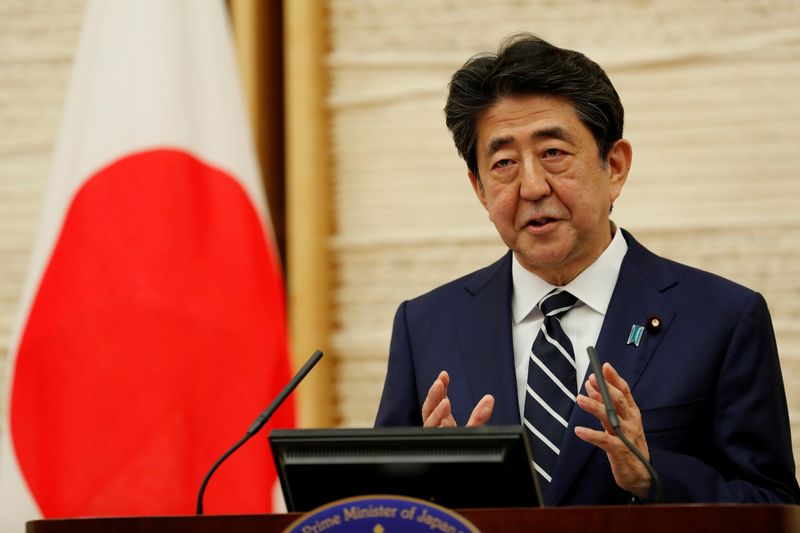By Tetsushi Kajimoto and Leika Kihara
TOKYO (Reuters) - A $94 billion emergency fund that can be tapped without parliamentary oversight has been branded Japanese Prime Minister Shinzo Abe's "pocket money" by opposition lawmakers alarmed at its unprecedented size.
Abe has said the 10 trillion yen ($94 billion) will allow the government to move swiftly to mitigate the impact of the coronavirus outbreak - a "once in a century crisis" which has devastated the economy.
"We'll report to parliament how we spend the money as needed and at the appropriate time," Abe told parliament on Friday.
But at 20 times the usual sum for a reserve fund - and roughly equal the amount Japan spends on education and defence combined - the fund has even raised questions from the bureaucrats who have discretion on how to spend the money.
"It's awful," said a finance ministry official. "It's a huge blank cheque that would leave Japan with a bad precedent," said the official, who spoke on condition of anonymity as he was not authorised to speak publicly.
Japan's parliament approved on Friday a record $300 billion second extra budget - including the reserve fund - to finance part of an economic stimulus package of $1.1 trillion.
The issue highlights how Abe, pressed with time and under pressure to match massive stimulus deployed by other major economies, has rankled taxpayers with spending that one of the most indebted nations can ill afford.
"Lawmakers of Abe's ruling party wanted a magical wallet and thought they can get one because we're in a crisis," said independent political affairs analyst Atsuo Ito.
"Fiscal reform has become a distant goal... The cost of big spending will fall upon the next generation."
Some analysts, however, argue the size is justified given the need to guard against a second wave of infection.
"You need huge sums in reserve when you're dealing with so much unpredictability. You need to be ready for emergencies," said Yasuhide Yajima, chief economist at NLI Research Institute.
For an interactive graphic on Japan's budget, click: https://tmsnrt.rs/2ApvKLg
Graphic: Japan's national budget, https://fingfx.thomsonreuters.com/gfx/editorcharts/xlbvggxokvq/eikon.png
CONSTITUTION
Japan typically sets aside reserves of around several hundred billion yen in the annual budget, largely to meet disaster relief and other unexpected costs.
The government has discretion on how to use the money and needs to report to parliament only after the funds are tapped.
Such reserves are usually kept small because it is an exception to a constitutional rule that requires budgetary spending to receive prior approval by parliament.
Japan has struggled to rein in spending even in good times and is now saddled with the biggest debt among industrialised nations that is twice the size of its $5 trillion economy.
The huge reserve - more than five times the 1.72 trillion yen deployed after the 2011 earthquake and tsunami - has sparked concern that the size could become the norm, rather than an exception.
Finance Minister Taro Aso rebuffed the idea of compiling a third extra budget, saying it was premature to discuss it.
"We first have to see how the measures we've taken so far affect the economy," he said.
Opposition lawmaker Toranosuke Katayama, a former ruling party heavyweight and among Japan's longest-serving politicians, scolded Abe in parliament over what he saw as breaching the boundaries of parliamentary democracy.
"Budget needs prior parliament approval. That is a core principle of Japan's constitution. What you're doing could violate this principle," he said.
"Even when you're making exceptions, you need to set a limit. Otherwise 10 trillion yen could easily turn into 12 trillion yen. That's what I'm worried about."
